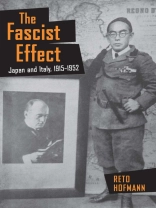In The Fascist Effect , Reto Hofmann uncovers the ideological links that tied Japan to Italy, drawing on extensive materials from Japanese and Italian archives to shed light on the formation of fascist history and practice in Japan and beyond. Moving between personal experiences, diplomatic and cultural relations, and geopolitical considerations, Hofmann shows that interwar Japan found in fascism a resource to develop a new order at a time of capitalist crisis.
Hofmann demonstrates that fascism in Japan was neither a European import nor a domestic product; it was, rather, the result of a complex process of global transmission and reformulation. Far from being a vague term, as postwar historiography has so often claimed, for Japanese of all backgrounds who came of age from the 1920s to the 1940s, fascism conjured up a set of concrete associations, including nationalism, leadership, economics, and a drive toward empire and a new world order.
Inhoudsopgave
Introduction1. Mediator of Fascism: Shimoi Harukichi, 1915–19282. The Mussolini Boom, 1928–19313. The Clash of Fascisms, 1931–19374. Imperial Convergence: The Italo- Ethiopian War and Japa nese World- Order Thinking, 1935–19365. Fascism in World History, 1937–1943Epilogue: Fascism after the New World Order, 1943–1952Notes
Bibliography
Index
Over de auteur
Reto Hofmann is Lecturer in Modern History at Monash University.












